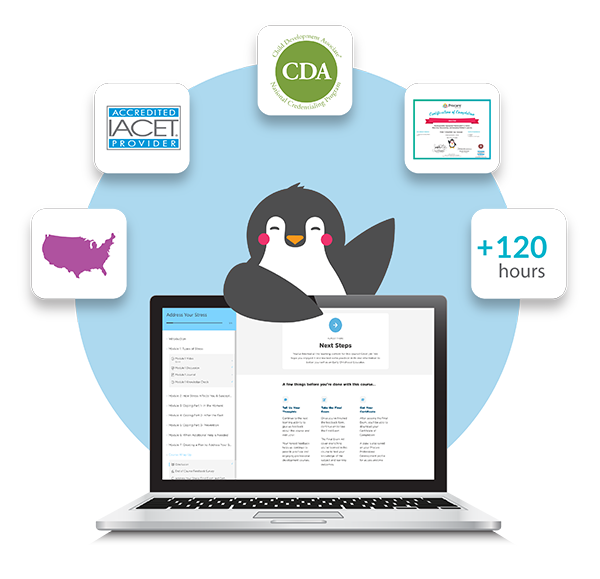
Today’s early childhood education teachers are craving professional development. But the 2025 Child Care Business Report from Procare Solutions revealed that even as ECE teachers ask for more training, roughly a quarter of respondents have no plans to implement professional training.
Understanding professional development is vital for child care leaders. Let’s take a look at five common questions about this type of training and get answers from Sammantha Boyle, the Procare Solutions manager of curriculum!
What is the CDA, and why is it important in ECE?
The CDA, or Child Development Associate credential, is the most recognized credential in early childhood education. Often described as the “first best step” or “next best step” in the field, the CDA combines on-the-job practical experience with formal education, creating a strong foundation for educators. It bridges the gap between learning about early childhood theory and applying it effectively in real-world classroom settings.
It’s highly respected in the ECE field and globally recognized. Many employers, such as Head Start and other child care centers, either require or strongly prefer candidates with a CDA, particularly for lead teaching roles. Earning the CDA demonstrates an educator’s dedication and seriousness about their role in early childhood education.
How does a child care center benefit from having CDA-credentialed staff?
For child care centers, CDA-credentialed staff offer several advantages. Teachers with a CDA are well-equipped to tackle classroom challenges such as managing behavioral issues or responding to emergencies. Directors can feel confident knowing their staff holds professional certifications that attest to their skills and preparedness.
And centers can use the CDA in their marketing. Highlighting CDA-credentialed teachers is likely to attract more families to enroll their children because parents value this level of training.
Another benefit is complying with state requirements. Many states mandate certain credential thresholds per student ratio, and the CDA helps centers meet those benchmarks.

What are the steps to earn a CDA?
For most people, completing the CDA takes about one year. There are five main parts to the CDA process:
Application:
- Easily completed online.
- Requires payment of an application fee, which covers the cost of the exam and verification visit.
Training and Experience:
- Training consists of 120 hours completed within five years, while experience requires at least 480 hours working with children in the past three years.
- Many CDA training programs are bundled for convenience.
Portfolio Creation:
- The portfolio includes competency statements and other documented evidence of training. It serves as a comprehensive showcase of your experience.
Verification Visit:
- During the verification visit, a Professional Development (PD) specialist observes the candidate in the classroom. This includes reviewing the candidate’s portfolio and having a constructive feedback session.
Final Exam:
- Completed in person. Results, along with the compiled portfolio and observation feedback, are submitted to the Council for Professional Recognition for evaluation.
4. What are the biggest hurdles to earning a CDA?
The two largest challenges that we hear from educators are finding time to complete the work and the cost.
Completing 120 hours of training can be difficult for those balancing full-time classroom work and personal responsibilities. But support from employers, such as scheduling flexible hours, can make a huge difference, as can giving staff small chunks of dedicated time to work on CDA training or portfolio tasks.
Pairing employees pursuing a CDA with experienced staff who have already earned the credential can provide guidance and encouragement. And center leaders absolutely should recognize and celebrate when staff hit significant milestones during their CDA process, not just at the conclusion!
And there are typically two costs involved with earning the CDA — training costs and the application fee. Scholarships, state grants and employer assistance programs can help alleviate these financial barriers. And when a child care center has a built-in professional development program available to staff, that makes a huge difference.
5. What is a CDA pathway and how does it help educators?
Programs like the Procare CDA Pathway break down the process into manageable steps, making the CDA more accessible.
Pathways divide the CDA coursework into smaller courses covering specific subject areas. Each course provides practical advice and guidance for compiling the required portfolio and writing competency statements.
And introductory and capstone courses guide participants through getting started and transitioning to final steps, such as exam registration.
How Procare Professional Development Can Help!

Professional development is a key requirement for child care providers as they grow and develop as leaders, educators and nurturers for the children in their care. Procare Professional Development makes professional development convenient, engaging and practical. And it gives child care providers access to everything they need to enhance their skills, elevate their careers and provide exceptional care for the children they serve.
This training aims to maximize the professional growth of child care providers while minimizing disruptions to their demanding schedules. Interactive lessons, notes and practical learning outcomes allow educators to balance their workloads and other commitments.
Procare is the only comprehensive solution that gives child care providers everything they need to help teachers and children thrive, including:
- Nationwide Accreditation: Certified by the International Accreditors for Continuing Education and Training, Procare Professional Development meets rigorous standards that are approved in all 50 states. Staff can earn Continuing Education Units (CEUs), which are vital for their professional growth and maintaining certifications.
- CDA Pathways: Procare Professional Development offers pathways for staff to achieve the nationally recognized CDA at no additional cost. This advanced certification propels career growth and reinforces the professional expertise of child care teams.
- Extensive Course Library: With over 120 hours of self-paced, interactive training covering the latest trends, techniques and best practices in early childhood education, staff have unlimited access to resources that support continuous learning.
- Simplified Certification: Upon completion of a course, staff will receive instant certification which can be tracked through the Procare Professional Development dashboard. For programs in states that require attendance verification by the training agency, Procare Solutions will record attendance in the state registry. Tracking progress, managing certifications and ensuring compliance with state or accreditation standards is handled.
Want to learn more? Listen to our episode of the Child Care Business Podcast in which Sammantha goes into greater detail about the CDA Pathway, Procare Professional Development and more!



